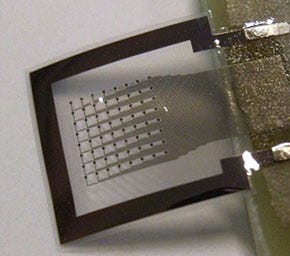DARPA Seeks to Develop Therapeutic Electric Brain Implants
June 19, 2014
The National Institutes of Health (NIH) says, "The Brain Research through Advancing Innovative Neurotechnologies (BRAIN) Initiative is ... aimed at revolutionizing our understanding of the human brain."
|
Implantable DARPA micro-electrodes can measure brain activity. |
As part of the BRAIN Initiative, the Defense Advanced Research Projects Agency (DARPA) has awarded contracts to Massachusetts General Hospital (MassGen) and the University of California, San Francisco, (UCSF) to create electrical brain implants capable of treating seven psychiatric conditions, including addiction, depression, and borderline personality disorder.
The complementary contracts, which launch the Systems-Based Neurotechnology for Emerging Therapies (SUBNETS) program, are the largest awards so far supporting the BRAIN Initiative. UCSF will receive as much as $26 million, and MassGen up to $30 million.
The SUBNETS program seeks to reduce the severity of neuropsychological illness in service members and veterans by developing closed-loop therapies that incorporate recording and analysis of brain activity with near-real-time neural stimulation. The program will use next-generation devices inspired by current Deep Brain Stimulation (DBS) technology.
DBS is already a therapy option for certain neurologic and neuropsychological illnesses in patients who are not responsive to other therapies. According to Medtronic, about 100,000 people around the globe live with a DBS implant. This device delivers electrical stimulation to reduce the motor impairment caused by Parkinson's disease and dystonia, and is also being studied as therapy for depression, obsessive compulsive disorder, Tourette's and epilepsy.
Refresh your medical device industry knowledge at MEDevice San Diego, September 10-11, 2014. |
According to DARPA, UCSF and MassGen will "oversee teams of physicians, engineers, and neuroscientists who are working together to develop advanced brain interfaces, computational models of neural activity, and clinical therapies for treating networks of the brain. The teams will collaborate with commercial industry and government, including researchers from Lawrence Livermore National Laboratory and Medtronic, to apply a broad range of perspectives to the technological challenges involved."
Writing for the MIT Technology Review, Antonio Regalado says the "project builds on expanding knowledge about how the brain works; the development of microlectronic systems that can fit in the body; and substantial evidence that thoughts and actions can be altered with well-placed electrical impulses to the brain."
"Imagine if I have an addiction to alcohol and I have a craving," says Jose Carmena, PhD, a professor at the University of California, Berkeley, involved in the UCSF side of the project. "We could detect that feeling and then stimulate inside the brain to stop it from happening."
Regalado reports that the United States faces an epidemic of mental illness among veterans, including suicide rates three or four times that of the general public. But drugs and talk therapy are of limited use, which is why the military is turning to neurological devices, says Justin Sanchez, DARPA's SUBNETS program manager.
The SUBNETS program plan calls for research to be conducted over the next five years along a schedule of prescribed milestones, culminating in technology demonstrations and submission of devices for approval by FDA.
"DARPA is in the business of creating not just science, but new technologies," Sanchez said. "The neurotechnologies we will work to develop under SUBNETS could give new tools to the medical community to treat patients who don't respond to other therapies, and new knowledge to the neuroscience community to expand the understanding of brain function. We believe this will be a foundational program."
Stephen Levy is a contributor to Qmed and MPMN
About the Author(s)
You May Also Like



.png?width=300&auto=webp&quality=80&disable=upscale)